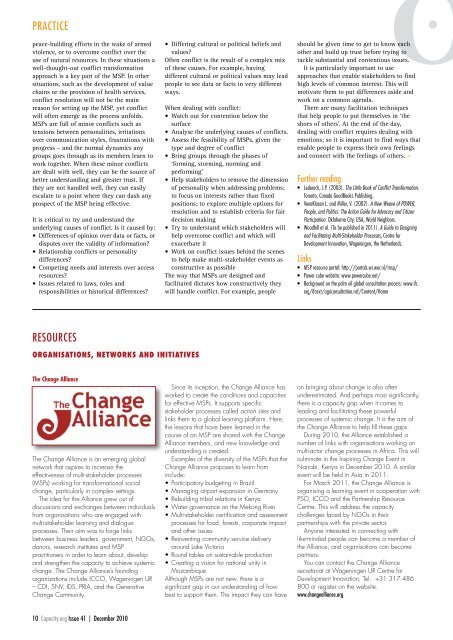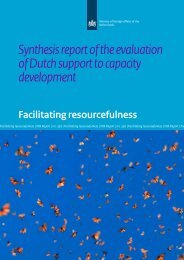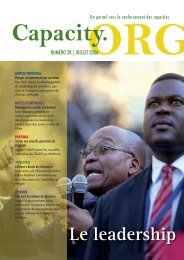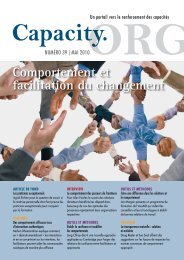PRACTICEpeace-building efforts in the wake of armedviolence, or to overcome conflict over theuse of natural resources. In these situations awell-thought-out conflict transformationapproach is a key part of the MSP. In othersituations, such as the development of valuechains or the provision of health services,conflict resolution will not be the mainreason for setting up the MSP, yet conflictwill often emerge as the process unfolds.MSPs are full of minor conflicts such astensions between personalities, irritationsover communication styles, frustrations withprogress – and the normal dynamics anygroups goes through as its members learn towork together. When these minor conflictsare dealt with well, they can be the source ofbetter understanding and greater trust. Ifthey are not handled well, they can easilyescalate to a point where they can dash anyprospect of the MSP being effective.It is critical to try and understand theunderlying causes of conflict. Is it caused by:• Differences of opinion over data or facts, ordisputes over the validity of information?• Relationship conflicts or personalitydifferences?• Competing needs and interests over accessresources?• Issues related to laws, roles andresponsibilities or historical differences?• Differing cultural or political beliefs andvalues?Often conflict is the result of a complex mixof these causes. For example, havingdifferent cultural or political values may leadpeople to see data or facts in very differentways.When dealing with conflict:• Watch out for contention below thesurface• Analyse the underlying causes of conflicts.• Assess the feasibility of MSPs, given thetype and degree of conflict• Bring groups through the phases of‘forming, storming, norming andperforming’• Help stakeholders to remove the dimensionof personality when addressing problems;to focus on interests rather than fixedpositions; to explore <strong>multi</strong>ple options forresolution and to establish criteria for fairdecision making• Try to understand which stakeholders willhelp overcome conflict and which willexacerbate it• Work on conflict issues behind the scenesto help make <strong>multi</strong>-stakeholder events asconstructive as possibleThe way that MSPs are designed andfacilitated dictates how constructively theywill handle conflict. For example, peopleshould be given time to get to know eachother and build up trust before trying totackle substantial and contentious issues.It is particularly important to useapproaches that enable stakeholders to findhigh levels of common interest. This willmotivate them to put differences aside andwork on a common agenda.There are many facilitation techniquesthat help people to put themselves in ‘theshoes of others’. At the end of the day,dealing with conflict requires dealing withemotions; so it is important to find ways thatenable people to express their own feelingsand connect with the feelings of others.
Multi-stakeholder partnerships as a donor strategyParadox or synergy?interviewThe Interchurch Organisation for Development Cooperation(ICCO) is a Dutch donor agency engaged in facilitating andfunding <strong>multi</strong>-stakeholder partnerships. Its unique approachhas been adopted by five other <strong>org</strong>anisations in the ICCOAlliance.Hettie Waltershettie.walters@icco.nlCoordinator, capacity development, ICCO, Utrecht,the NetherlandsHettie Walters is ICCO’s capacitydevelopment (CD) coordinator. Shepromotes learning alliances and knowledgedevelopment, specifically in relation toICCO’s programmatic approach and to CD. Inan interview with <strong>Capacity</strong>.<strong>org</strong>, Hettieexplains how this approach can be applied to<strong>multi</strong>-stakeholder partnerships (MSPs).Hettie, why does ICCO engage infacilitating MSPs?As a donor agency, our focus for many yearsnow has been on matters relating to, amongother issues, accessing basic services, financialservices, international and local markets,democratisation and conflict transformation.We have learned that we cannot addressthese issues by giving support to single<strong>org</strong>anisations. In order to bring about whatwe call ‘systemic <strong>change</strong> at the institutionallevel’, it’s necessary for <strong>multi</strong>ple <strong>actor</strong>s tobecome involved. That’s why over the lastfour years our programmatic approach hasgradually moved towards mobilising <strong>multi</strong>ple<strong>actor</strong>s to collaborate and bring about <strong>change</strong>.Learning to think in terms of systems is acore element of this approach. Systems canbe small and linked to a specific localproblem, or large enough to encompass awhole value chain. By systems we mean, forexample, the structures that create or limitAlamy / Jayne FincherChildren attending a school in Ladakh, Indiathe opportunities for children who live inremote mountain areas to attend school andreceive an education through their ownlanguage; or the structures that ensure thatmen are regarded as the heads of householdsand hold the titles to the land, while womenhave no property rights and cannot operateindependently in the marketplace.Another example of this sort of system isthe one that excludes young people fromeffective health care by preventing access toinformation on sexual and reproductivehealth and rights. In all these systems,families, community <strong>org</strong>anisations, NGOs,government agencies and the private sectortend to interact in a way that ensures thesystem stays as it is.Where does ICCO’s involvement with anMSP start?Our point of departure is usually the<strong>org</strong>anisation with which we already have afunding relationship. This is normally anNGO, a community-based <strong>org</strong>anisation or asocial movement. In this context, we bringtogether partners who have an interest inaddressing a specific problem. We jointlyanalyse the system and determine whichother <strong>actor</strong>s need to get involved in theprocess – <strong>actor</strong>s such as government orprivate-sector <strong>org</strong>anisations. We brainstormabout possible solutions, and identify acommon purpose focused on the <strong>change</strong>sthat we think the system needs.In the beginning, we noticed that effortsto widen the circle of <strong>actor</strong>s were met withsome resistance. Partners feared that theywould have to share funding with thenewcomers. As a donor <strong>org</strong>anisation, we arealways confronted with something of aparadox when striking a balance betweenfunding and facilitating MSPs.We deal with this by reassuring partnersthat the level of funding will not be affectedif other <strong>actor</strong>s come in. Funding andfacilitation are strictly separate channels andhandled by different people. For facilitation,we try to hire local consultants wheneverpossible. Also the facilitation cycle is differentfrom the funding cycle. It is shorter andfocused on getting the process started. Ourapproach also has an inbuilt exit strategy.As a donor, you are in a powerful position.How do you avoid exerting influence to theextent that it undermines local ownershipof the process?Well, you can call this the second paradox ofbeing a donor and a facilitator at the sametime. This has been one of the subjects ofour learning process since we first started toengage with MSPs. As donors, we need to beaware that MSPs do not necessarily need theinvolvement of ICCO or other externalagencies. We need to be sensitive to theexistence of endogenous MSP processes. Andwhen we find them, we should make surethey are nurtured – if this is necessary.When we become involved with an MSP– whether as a catalyst or in a nurturing role– we have to be careful not to impose ourprogramme implementation agenda. This is adelicate balance. it demands great skill onthe part of the facilitators. We are makingsteady progress in mastering these skills butI would not claim that we have arrivedwhere we want to be.We are still learning but I am confident thatwe can work in synergy with local <strong>actor</strong>s inan MSP and make an important contributionto <strong>change</strong> by empowering them.













